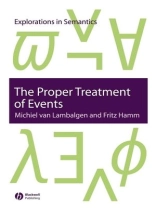The Proper Treatment of Events offers a novel approach to the semantics of tense and aspect motivated by cognitive considerations.
- offers a new theory of the semantics of tense aspect and nominalizations that combines formal semantics and cognitive approaches
- written accessibly for students and scholars in theoretical linguists, as well as in philosophy of language, logic, cognitive science, and computer science
- accompanied by a website at (http://staff.science.uva.nl/~michiell/) that provides slides for instructors and background material for students
Spis treści
Figures.
Preface.
Par t I: Time, events and cognition.
Chapter 1: Time.
Psychology of time.
Why do we have the experience of time at all?.
Chapter 2: Events and time.
The analogy between events and objects.
The Russell-Kamp construction of time from events.
Walker’s construction.
Richer languages for events.
Some linguistic applications.
**Continuous time from events.
Conclusion.
Chapter 3: Language, time and planning.
Part II: The formal apparatus .
Chapter 4: Events formalized.
A calculus of events.
The axiom system EC.
Scenarios.
Minimal models.
Chapter 5: Computing with time and events.
Logic programming with constraints.
Minimal models revisited.
How to get to the other side of a street.
**When do causes take effect?.
Exercises for chapters 4 and 5.
Da capo, with feeling.
Chapter 6: Finishing touches.
Coding VPs as fluents and events.
Consistency, truth and partiality.
Part III: A marriage made in he aven – linguistics and robotics.
Chapter 7: Aktionsart.
Eventualities.
Formal definition of Aktionsarten.
Perfective and imperfective eventualities.
Chapter 8: Tense.
Reichenbach’s reference time R.
Event time and the sentence.
Present tense.
Past tense.
Future tense.
Exercises.
Chapter 9: Tense in French: Passé Simple and Imparfait.
Introduction.
Data.
Formalizing the Passé Simple and Imparfait.
Coda.
Exercises.
Chapter 10: Grammatical aspect.
The perfect.
The progressive.
**A computational proof.
Comments on the literature.
Exercises.
Chapter 11: Coercion.
Additive coercion.
Subtractive coercion.
Cross–coercion.
Temporal adverbials: ‘in’ and ‘for’.
Coercion and intensionality.
Exercises.
Chapter 12: Nominalization.
Two types of English Gerunds.
History of the English gerundive system.
Nominalizations formalized I: Denotation types.
Nominalizations formalized II: Lexical meaning.
Chapter 13: Appendix: the basics of logic programming.
Logic programming for propositional logic.
Logic programming for predicate logic.
References.
Index.
O autorze
Michiel van Lambalgen is Professor of Logic and Cognitive Science at the University of Amsterdam.
Fritz Hamm is Assistant Professor of General Linguistics at the University of Tübingen.












